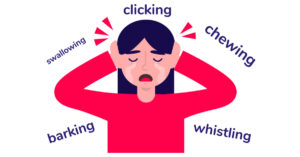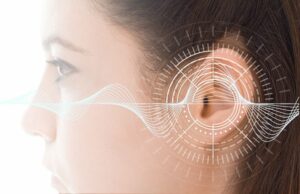Do you have a strong reaction to certain sounds? If so, you may be wondering if you have Misophonia OCD. Misophonia is a condition that causes people to have a strong emotional response to specific sounds. This can include feelings of anger, frustration, or anxiety. Many people with Misophonia also experience symptoms of OCD. In this blog post, we will discuss the link between Misophonia and OCD, and provide tips for how to cope with both conditions.
Contents
What Is Misophonia OCD? 
OCD is a disorder characterized by obsessive thoughts and compulsive behaviors. In Misophonia, certain sounds trigger negative emotions. Misophonia OCD combines the two disorders to create a new and unique condition.
Misophonia OCD is a newly discovered disorder that combines the symptoms of Misophonia with those of OCD. It is a condition where certain sounds cause an intense emotional reaction, such as anger, anxiety, or disgust.
What Are The Symptoms?
Misophonia OCD is characterized by a strong dislike or hatred of certain sounds. Symptoms may include:
- feeling agitated, angry, or annoyed when you hear certain sounds
- avoiding places or situations where you might hear the trigger sound
- feeling depressed, anxious, or hopeless due to the Misophonia OCD
- difficulty concentrating or focusing on tasks due to the trigger sound
- feeling the need to leave or get away from the source of the sound
- missing work or school due to the Misophonia OCD
- feeling nauseated or sick to your stomach when you hear certain sounds
- strained relationships with family and friends due to Misophonia OCD.
- feeling like you need to scream, shout, or hurt someone when you hear certain sounds
The above-mentioned are some of the major warning signals of Misophonia OCD.
Link Between Misophonia And OCD 
Obsessive-compulsive disorder (OCD) is characterized by intrusive, unwanted thoughts and repetitive behaviors that are carried out to alleviate anxiety. Misophonia, on the other hand, is an extreme dislike or hatred of certain sounds. Misophonia is often comorbid with OCD, which means that the two conditions frequently occur together.
There are a few theories about why Misophonia and OCD might be linked. One theory is that Misophonia may be a form of sensory processing disorder (SPD). SPD is a condition in which the brain has difficulty processing and interpreting information from the senses. Misophonia may also be caused by an overactive startle reflex, which is when the body’s natural fight-or-flight response is triggered by certain sounds.
Misophonia and OCD also share similar features, such as hypervigilance, perfectionism, and avoidance behaviors. Misophonic individuals may avoid certain situations or people that trigger their Misophonia, while people with OCD may avoid situations that trigger their obsessions. Both Misophonia and OCD can also lead to social isolation and problems at work or school.
Furthermore, Misophonia and OCD share similar treatments, such as Cognitive Behavioral Therapy (CBT) and Exposure and Response Prevention (ERP). CBT is a type of therapy that helps people change their thoughts and behaviors. ERP is a type of exposure therapy that helps people face their fears and learn to manage their anxiety.
Finally, it can be said that Misophonia and OCD are two different but related conditions. Misophonia is often comorbid with OCD, which means that the two conditions frequently occur together.
What Are The Causes?
Misophonia can be a debilitating condition that significantly impacts a person’s quality of life. Here are some risk factors for Misophonia OCD:
Suffering From Anxiety Or Depression
It’s no secret that people with Misophonia often also suffer from anxiety and depression. In fact, Misophonia is sometimes mistaken for one of these disorders.
People with Misophonia OCD have a history of anxiety or depression, which results in them having obsessive thoughts about certain sounds. These thoughts can be so intrusive that they result in the person avoiding situations where they might hear the sound, or feeling extremely anxious when they do hear it.
In some cases, the person might even start to develop compulsions, such as repeatedly checking to see if a door is locked or washing their hands after coming into contact with something they fear is contaminated.
Having Perfectionism Or Rigidity
It is interesting to think about how different personality traits can lead to Misophonia OCD. For example, people who are perfectionists or have a lot of rigidity in their thinking may be more likely to develop Misophonia OCD.
This is because they may be more sensitive to certain sounds and may feel that they need to control their environment in order to avoid feeling overwhelmed or stressed.
Being Highly Sensitive To Criticism
When someone is highly sensitive to criticism, they may start to develop Misophonia OCD. This is because they become so focused on avoiding any potential criticism that they start to obsess over it. This can lead to them feeling like they need to control everything in their environment, and this can eventually result in Misophonia OCD.
Having Post-Traumatic Stress Disorder
Misophonia OCD can result from post-traumatic stress disorder. When someone experiences a traumatic event, their brain goes into survival mode. The amygdala, which is the part of the brain responsible for fear and anxiety, becomes more active. This can cause a person to become more easily triggered by things that remind them of their trauma.
For example, let’s say that someone was in a car accident where they heard screeching tires followed by a loud crash. Now, every time they hear a similar sound, their amygdala becomes activated and they feel like they are in danger again.
Their heart rate increases, they may start to sweat, and they may feel like they need to escape. This can be extremely debilitating and make it hard for someone to live a normal life.
Suffering From Autistic Spectrum Disorder
ASD is a condition that affects how people interact with the world and perceive sensory information.
There are many theories as to why ASD may result in Misophonia OCD. One theory suggests that Misophonia OCD may be due to oversensitivity to sound. People with ASD are often hypersensitive to stimuli, and this hypersensitivity may extend to sound.
Another theory suggests that Misophonia OCD may be due to problems with filtering out irrelevant information. People with ASD often have difficulty filtering out irrelevant information, and this may include certain sounds that trigger an emotional reaction.
Being A Workaholic
When you’re a workaholic, you need to be able to keep track of deadlines, projects, and meetings. Misophonia OCD can result from this type of organization. Misophonia OCD is when you have an intense dislike or fear of certain sounds.
This can include the sound of someone eating, typing, or even breathing. For people with Misophonia OCD, these sounds can trigger anxiety and panic.
What Are The Consequences?
Misophonia OCD can have a number of adverse outcomes including:
Interference With Work Or School
Misophonia OCD results in Interference with work or school because it is a form of anxiety. It can cause people to feel anxious about certain sounds, and this can lead to them feeling like they need to avoid those situations where they might hear those sounds. This can make it difficult for people to concentrate on their work or studies.
Avoidance Of Social Situations
Misophonia OCD can result in avoidance of social situations. For example, someone may avoid going to a restaurant because they are afraid of being triggered by the sound of people eating. This can lead to isolation and a decrease in quality of life.
It can also result in the avoidance of social situations. For example, if you are at a party and someone is eating loudly, you may feel the urge to leave the room or ask the person to stop. This can lead to avoiding parties or other gatherings where food is present.
Strained Relationships
Misophonia OCD can result in strained relationships for a number of reasons. First, the constant noise and movement can be extremely distracting and make it difficult to focus on anything else. This can make conversation difficult and lead to miscommunications.
Additionally, the sufferer may become irritable and short-tempered due to the constant stimuli, making them difficult to be around. Misophonia is not well-known or understood by the general public, which can make it difficult for individuals with Misophonia OCD to find others who can relate to their experiences.
Isolation And Loneliness
Individuals with Misophonia OCD often avoid places or situations where they know they will be exposed to trigger sounds. This avoidance can lead to social isolation as individuals often miss out on important activities and events.
Second, even when individuals with Misophonia OCD are around other people, they may feel isolated due to the fact that they cannot fully enjoy their company. This is because their misophonic symptoms are always present in the back of their mind, causing them to focus on the trigger sounds rather than the conversation or activity at hand.
Aggressive Or Violent Outbursts
Individuals often have difficulty regulating their emotions, which can lead to anger and frustration. Second, this mental disorder can cause people to feel isolated and alone, which can also lead to anger and frustration.
Finally, Misophonia OCD can interfere with an individual’s ability to think clearly and make rational decisions, which can again lead to angry and violent outbursts. In short, the combination of emotional dysregulation, isolation, and impaired decision-making that is often seen in people with Misophonia OCD can create a perfect storm for aggression.
Self-Harm Or Thoughts Of Suicide
Misophonia OCD can result in self-harm or thoughts of suicide for several reasons. First, individuals may feel that they are constantly being bombarded by noise and stimuli that they can’t control. This can lead to a feeling of powerlessness and anxiety.
Second, Misophonia OCD can cause people to isolate themselves from others, which can lead to feelings of loneliness and depression. Finally, the constant worry and stress associated with Misophonia OCD can take a toll on someone’s mental health, leading to further distress and possibly suicidal thoughts.
Trouble Sleeping
People with Misophonia OCD often have difficulty falling asleep because they are constantly thinking about the sounds that bother them. The problem can also cause people to wake up during the night because they are bothered by the sound of their partner snoring or another noise in the environment.
Finally, this mental disorder can make it difficult to stay asleep because sufferers may be repeatedly awakened by the sound of their own heartbeat or other internal noises. All of these factors can contribute to insomnia and other sleep problems.
Physical Signs
Misophonia OCD can result in physical symptoms such as increased heart rate, sweating, or nausea. For example, if you are sitting in a restaurant and the person next to you is eating loudly, your Misophonia OCD may cause you to feel nauseous.
Alternatively, if you are at a movie theater and the person behind you keeps kicking your seat, your Misophonia OCD may cause you to sweat profusely. In both of these cases, the physical symptoms are a direct result of the dreadful disorder.
How Professional Therapies May Help?
Misophonia OCD is a debilitating condition that can wreak havoc on a person’s life. But with the help of treatments like TRT, many people are able to recover and live normal, healthy lives.
Tinnitus Retraining Therapy

TRT is a form of counseling that aims to help people who suffer from tinnitus or ringing in the ears. The therapy involves two parts: education and habituation.
The goal of education is to help the sufferer understand what tinnitus is, how it affects them, and what can be done to manage it.
Habituation is a process of desensitization whereby the person learns to tolerate the sound of their tinnitus by exposure to it in gradually increasing doses.
Cognitive-Behavioral Therapy
CBT is a type of psychotherapy that can help people change the way they think and behave. People who have Misophonia OCD often have negative thoughts about themselves and the world around them.
CBT can help people learn to challenge and change these negative thoughts. Additionally, people with Misophonia OCD often avoid certain situations or activities that trigger their Misophonia symptoms. CBT can help people learn to face their fears and cope with their symptoms in a healthy way.
Exposure And Response Prevention
ERP therapy is a type of cognitive-behavioral therapy that helps people recover from Misophonia OCD by gradually exposing them to the things they fear and helping them learn to respond in new, more positive ways.
For example, if someone is afraid of hearing certain sounds, their therapist may help them slowly and safely expose themselves to those sounds over time. They would then work on learning how to respond differently to the sound instead of having a negative reaction. They learn to focus on something else or take deep breaths.
How Self-Care Strategies May Help?

Misophonia OCD can be a difficult thing to live with, but there are things you can do to help ease your symptoms. Here are some self-care tips that may help you recover:
- Identify your triggers: What sounds, sights, or smells trigger your Misophonia? Once you know what sets off your Misophonia, you can try to avoid these triggers or minimize your exposure to them.
- Use relaxation techniques: Relaxation techniques such as deep breathing and meditation can help calm you when you’re feeling triggered.
- Talk to someone who understands: Misophonia can be a very isolating condition, but talking to someone who understands what you’re going through can be very helpful. Misophonia support groups or therapy can be a great way to connect with others who understand what you’re going through.
- Treat underlying conditions: If you have any underlying mental health conditions such as anxiety or depression, treating these conditions can help ease your Misophonia symptoms.
- Practice self-compassion: Misophonia can be hard to deal with, but it’s important to be kind to yourself. Practice self-compassion by being understanding and forgiving of yourself when you’re having a tough time.
Following these tips can help you recover from Misophonia OCD and live a more peaceful life. If you think you may be suffering from this mental disorder, please reach out to a mental health professional for help. Such ailment is a treatable condition and with the right help, you can learn to manage your symptoms and live a fulfilling life.
Conclusion
Misophonia is a neurological disorder that should not be taken lightly. It can be very debilitating and prevent people from enjoying their lives. The best way to deal with Misophonia is to get help from a professional who can help you manage your symptoms. If you think you might have Misophonia, please don’t hesitate to reach out for help.
If you are struggling with Misophonia, know that you are not alone and there is hope. With the right treatment, Misophonia can be managed so that it no longer interferes with your life.
After all, life carries enough challenges as is. Why make it harder by letting Misophonia take over? Live your best life because you deserve it. You can get better, I promise.
Professional Guidance is the first step in order to move toward your healing journey. You can try reaching Mantra Care to seek expert help in the comfort of your own home. Our therapists will help you get a solution to manage and overcome your problem. You can book your online therapy and talk directly to your assigned mentor. You may also download our free Android or iOS app.








